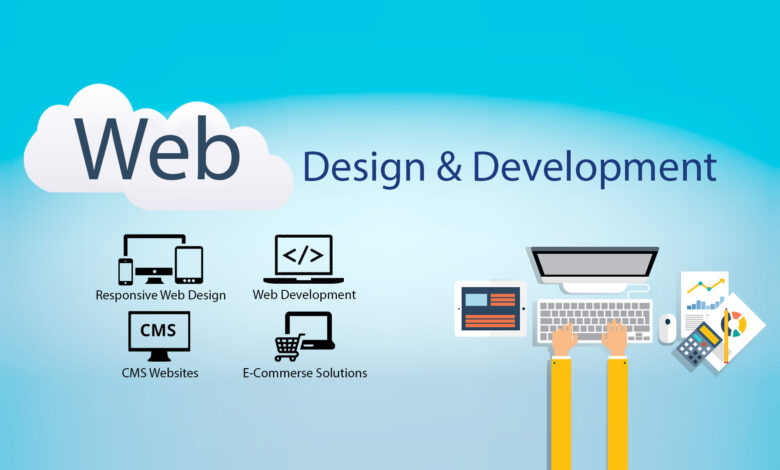How to Choose the Right Website Development Platform For Your Business

In this digital era, a website is more than just a business card—it’s the focal point of your brand’s online presence.
But with a sea of website development platforms out there, how do you make the right choice?
What’s the secret sauce to selecting the platform that meets your unique business needs? Stick around as we explore these questions and guide you through the process.
Overview Of a Website Development Platform
A website development platform is your launchpad to the online world. It’s like a digital toolbox that helps you create, customize, and manage your web presence. In a nutshell, it’s the foundation on which your website stands.
However, not all platforms are created equal. They come in all shapes and sizes, boasting different features and functionalities. From basic blogging platforms to sophisticated e-commerce systems, the range is extensive.
Why Does it Matter?
The right platform can make or break your online presence. Imagine trying to build a skyscraper on a weak foundation. The same applies to your website. The platform you select will impact everything, from design flexibility to site speed.
A poorly chosen platform may result in a clunky, unresponsive site. You don’t want to lose potential customers because your website took an extra second to load, right?
Also, remember that as your business grows, your website should too. A platform that doesn’t allow for growth could hinder your business. It’s like trying to fit into an old pair of jeans – not a comfortable experience.
Types Of Website Development Platforms
Here are some types:
Content Management Systems (CMS)
Content Management Systems (CMS) are popular website development platforms that simplify the process of creating and managing websites. They provide user-friendly interfaces, templates, and plugins to customize your site without extensive coding knowledge.
Pros:
- Easy to use: CMS platforms offer intuitive interfaces, making website creation and content management accessible to non-technical users.
- Wide range of themes and plugins: CMS platforms provide a vast selection of templates and plugins, allowing you to customize your site’s design and functionality.
- Regular updates and community support: CMS platforms often receive frequent updates and have active communities that offer support and guidance.
Cons:
- Limited flexibility: CMS platforms may have limitations when it comes to customization, especially for complex or highly customized websites.
- Potential compatibility issues: Using numerous plugins and themes can lead to conflicts and compatibility issues.
- Security vulnerabilities: The popularity of CMS platforms makes them attractive targets for hackers, requiring proper security measures to protect your site.
E-commerce platforms
E-commerce platforms are specifically designed for creating and managing online stores. Shopify, Magento, and WooCommerce are popular options in this category.
Key features for online stores:
- Secure payment gateways: E-commerce platforms provide built-in payment gateways or support integration with popular payment providers to ensure secure online transactions.
- Inventory management: Easily track and manage your product inventory, including stock levels, variants, and restocking notifications.
- Product catalogs: Create and organize product listings, including images, descriptions, pricing, and categorization.
- Order tracking: Provide real-time updates on the status and delivery of customer orders.
- Customer support tools: Integrated customer support features like live chat, ticketing systems, and customer feedback options.
Custom development frameworks
Custom development frameworks such as Laravel, Ruby on Rails, and Django offer powerful tools for building customized web applications.
Benefits of custom development:
- Flexibility and control: Custom development frameworks allow for complete control over the design, functionality, and scalability of your website.
- Unique features: With custom development, you can create unique and tailor-made features specific to your business requirements.
- Performance optimization: Custom development frameworks enable fine-tuning and optimization to enhance the performance and efficiency of your website.
- Long-term scalability: Custom solutions can be designed to accommodate future growth and evolving business needs.
- Integration capabilities: Custom development frameworks offer flexibility for integrating with external systems and APIs.
Factors to Consider When Choosing a Platform
Now that you have an overview of the different types of website development platforms, let’s delve into the key factors you should consider to find the most suitable platform for your business. These factors will help you make an informed decision and ensure long-term success.
Budget and cost considerations
Evaluate your budget and determine the cost of the platform, including any licensing fees, hosting expenses, and additional features or plugins you may need. It’s essential to strike a balance between affordability and the necessary functionality for your business.
User-friendliness and ease of maintenance
Consider how user-friendly the platform is, both for website creation and ongoing maintenance.
A platform with an intuitive interface, drag-and-drop functionality, and a user-friendly admin panel can save you time and frustration.
Additionally, assess the platform’s ease of updating content and making changes without extensive technical knowledge.
Scalability and flexibility
Think about your future growth plans. Will the platform be able to handle increased traffic and accommodate new features or functionalities as your business expands?
Look for a platform that offers scalability and flexibility, allowing you to adapt and grow without significant disruptions or limitations.
Available support and community resources
Consider the availability of support and community resources for the platform you choose. Is there a dedicated support team you can reach out to for assistance?
Are there active user communities, forums, or documentation where you can find answers to your questions?
Research and compare different platforms
Once you have a good understanding of your requirements and the key factors to consider, it’s time to research and compare different website development platforms. Here are some steps you can take:
Reading reviews and case studies
Read reviews and case studies of the platforms you’re interested in. Look for feedback from businesses similar to yours and pay attention to their experiences, both positive and negative. This can give you valuable insights into the strengths and weaknesses of each platform.
Seeking recommendations from industry peers
Reach out to industry peers, colleagues, or professionals in your network who have experience with website development platforms. Their recommendations and insights can provide valuable guidance in your decision-making process.
Testing platform demos and trial versions
Take advantage of platform demos and trial versions. Sign up for free trials or demos offered by the platforms you’re considering. This hands-on experience will give you a feel for the platform’s interface, features, and usability.
Conclusion
Selecting the most suitable website development platform for your business is a crucial decision that can significantly impact your online presence. To ensure you make an informed choice, consider factors like budget, user-friendliness, scalability, and available support.
If you’re looking for a reliable and top-notch platform for web development, I highly recommend to visit eggsmedia.com/web-development-company. With their expertise and dedication to delivering exceptional results, Eggsmedia is one of the best choices for your web development needs.
Take your business to new heights by discovering the perfect platform to elevate your online presence today!



